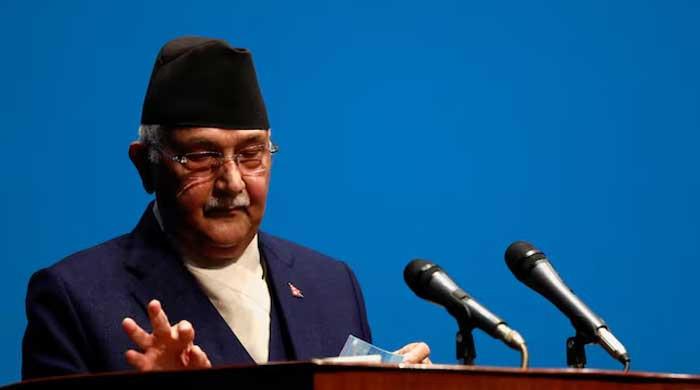 |
| Nepal's Prime Minister Khadga Prasad Sharma Oli, also known as KP Oli, delivers a speech before a confidence vote at the parliament in Kathmandu. — Reuters/File |
Nepal PM resigns after deadly protests sparked by social media ban
The protests, which first erupted on Monday, were driven by anger over government corruption and a controversial ban on social media platforms. Although authorities quickly restored access to the apps in an attempt to calm the public, the decision came too late to contain the fury of largely Gen Z demonstrators.
Crowds of protesters stormed Kathmandu, setting fire to parliament and attacking government buildings. Plumes of black smoke filled the sky as hundreds breached security barriers and torched the main parliamentary chamber. “Hundreds have breached the parliament area and torched the main building,” confirmed Ekram Giri, spokesman for the Parliament Secretariat.
Prime Minister Oli’s private residence was also targeted, with demonstrators setting it ablaze before gathering outside other key government buildings. According to reports on the ground, some protesters were armed with assault rifles as they clashed with security forces deploying water cannons.
Faced with mounting chaos, Oli—Nepal’s 73-year-old four-time prime minister and leader of the Communist Party—announced his resignation. “I have resigned from the post of prime minister with effect from today... in order to take further steps towards a political solution and resolution of the problems,” he said in a statement. His departure followed the resignations of three other ministers, underscoring the depth of the crisis.
Oli’s long political career has spanned nearly six decades, including the country’s bloody civil war and the 2008 abolition of its absolute monarchy. He first became prime minister in 2015, returned to office in 2018, briefly held the post in 2021, and regained power in 2024 through a coalition government with the Nepali Congress.
The current unrest, however, has revealed the growing disconnect between Nepal’s political elite and its restless younger generation. More than 43 percent of the population is between the ages of 15 and 40, yet unemployment remains around 10 percent and GDP per capita is just $1,447, according to the World Bank. For many, the social media ban became a symbol of deeper frustrations with corruption, inequality, and lack of opportunity.
Amnesty International reported that live ammunition was fired during Monday’s crackdown, while the United Nations called for a swift and transparent investigation into the deaths. Student leader Yujan Rajbhandari, 23, accused the government of brutality: “Nearly 20 people were murdered by the state—that shows the scale of police brutality.”
Videos widely shared on TikTok, which had not been blocked, fueled further anger by contrasting the struggles of ordinary Nepalis with images of politicians’ children flaunting luxury goods and expensive holidays. Platforms like Instagram, Facebook, and YouTube—widely used for communication, business, and entertainment—had been blocked after the government cut access to 26 unregistered platforms on Friday.
“This isn’t just about social media—it’s about trust, corruption, and a generation that refuses to stay silent,” wrote The Kathmandu Post. The paper emphasized that for Nepal’s Gen Z, digital freedom is synonymous with personal freedom: “Cutting off access feels like silencing an entire generation.”
Nepal has a history of imposing online restrictions, including a Telegram ban in July and a nine-month suspension of TikTok that ended last year after the platform agreed to comply with local regulations. But this latest crisis highlights how deeply intertwined digital access is with politics, identity, and public trust in the Himalayan nation.
As Kathmandu remains tense and parliament lies in ruins, the resignation of Oli has done little to ease uncertainty. For many, the protests represent not just a rejection of censorship but also a demand for accountability in a country still struggling to live up to the democratic promises made when the monarchy fell 16 years ago.
